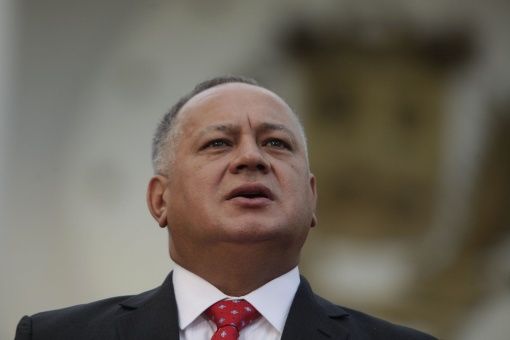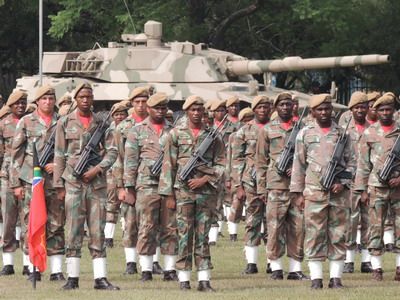U.S. government plays games with top Venezuelan officials
BY FRANCO ORDOÑEZ
fordonez@mcclatchydc.com
July 24, 2018 01:25 PM
Updated July 24, 2018 01:26 PM
WASHINGTON
The first piece of a psychological plot by the U.S. government to raise suspicion that one of the most powerful men in Venezuela may be a CIA operative was hatched in a seventh floor office of the State Department.
Around April 2017, Fernando Cutz, then-senior director at the National Security Council, stopped by the Foggy Bottom office of a veteran diplomat to get ideas about how to destabilize Venezuelan President Nicolás Maduro’s inner circle, with the goal of further weakening the government that has thrown the once-thriving country into poverty and chaos.
As a bobble-head statue of the iconic socialist leader Hugo Chávez looked down from a shelf above them, Ambassador William Brownfield joked with Cutz that it wasn’t advanced science. There were tactical benefits to selectively choosing leaders to target with sanctions, travel restrictions and other punishments and to raise questions within the Venezuelan hierarchy about the people left alone by the U.S.
This account of an intentional strategy by the U.S. government to sow confusion about the loyalties of Maduro’s closest advisers comes from former and current officials with direct knowledge of the plans who spoke to McClatchy.
Think about being strategic,” Brownfield told Cutz, according to these officials. “Don’t just hit everyone because you can. Hit the right people and then maybe get others to just be scared and wonder when they’ll get hit.”
The strategy of singling out one top official for isolation from the sanctions regime to raise suspicion is one that U.S. law enforcement has used to destabilize drug cartels. It’s unclear whether the U.S. has ever used it against another government.
Caracas was particularly vulnerable for such a plan because of leadership struggles from a collapsing economy and ongoing questions whether Maduro was the right successor to Chávez.
“Maduro is not nearly as smart, talented or, quite frankly, respected and supported as was Chávez, and started from a weaker position,” said a former official. “His weaker position also means that virtually everyone in his government, until this day, at a senior level, with the possible exception of a few military people, were not Maduro’s people. They were Chávez people.”
For over a year, Diosdado Cabello, the former military commander and vice president of Venezuela’s governing United Socialist Party, escaped sanctions that hit more than 50 other Venezuelan officials, including Maduro, on corruption and other charges. President Trump’s travel ban also limits travel to the U.s. by Venezuelan government officials.
Not until May did the U.S. Treasury Department finally impose sanctions against Cabello, accusing him of state-aided narco-trafficking and corruption. Cabello’s brother and wife were also sanctioned.
The decision not to sanction Cabello for more than a year while others around him suffered penalites mystified officials in Washington and Venezuela. And some began to wonder whether Cabello was talking to the United States, or even acting as a CIA agent.
Cabello was a natural target. He was already worrisome because he was close to Chávez, fought alongside him, and was Maduro’s longtime rival to take over leadership of the country after Chávez died.
When Cutz visited Brownfield last year, Brownfield was the most experienced official dealing with the Venezuelan government, having served as ambassador to Venezuela when Chávez was coming to power. At the time he gave Cutz the idea for the targeted sanction strategy, Brownfield led the State Department’s Bureau of International Narcotics and Law Enforcement Affairs.
Brownfield was also known around the White House and State Department as someone who really knew how to “mess with the Chávez mentality,” a senior administration official said, speaking on condition of anonymity to discuss internal deliberations.
Brownfield and Cutz’s conversation never focused on Cabello, per se, but they discussed the concept and benefits of selective sanctioning.
The Trump administration was turning up the pressure on the Maduro government with repeated sanctions and travel restrictions. Names were being circulated about who could be next.
Cutz took the idea back to the White House and then the State Department, where he pitched it to Deputy Assistant Secretary Michael Fitzpatrick and Annie Pforzheimer, who was then director of the office of Andean Affairs in the Western Hemisphere.
Fitzpatrick and Pforzheimer liked it. The three worked together. They brainstormed different names and settled on Cabello.
The idea was eventually broached with senior White House officials who approved it.
“Is Diosdado talking to the gringos,” a former administration official said, describing the questions the U.S. hoped would be raised within Venezuelan government circles. “Is that what is going on here? Or is it the alternative? Is it Diosdado saying, ‘are they sending me a message? Are they sending me a signal? What’s going on?’ That is not a bad thing.”
Besides his influence and position within the Venezuelan government, U.S. officials saw him as a bit of a chameleon who presented himself differently inside and outside the country. Globally, he projected an image of moderation and pragmatism, but inside officials said he acted “más chavista que chavista,” or, “more like Chávez than Chávez.”
LATAM-PINKTIDE(3)
Venezuela's President Hugo Chavez speaks while holding a copy of the Venezuelan National Constitution during his weekly radio and television show known as "Hello President" in Caracas, Sunday, Oct. 7, 2007.
AP
Mark Feierstein, the White House National Security Council’s senior director for Western Hemisphere affairs under President Barack Obama, said Cabello was among a group of party members who were dissatisfied with Maduro’s leadership and looked to be angling for a way to take over.
“We thought he wanted to be president and that he wanted to replace Maduro,” Feierstein said.
The Trump administration wouldn’t address the plot or why they eventually abandoned it, but pressure was building to take action against Cabello.
Sen. Marco Rubio, R-Florida, who has Trump’s ear on Latin America issues and publicly feuded with Cabello, pressed Trump in January to finally hold Cabello accountable. Mike Pompeo, the new secretary of state who had endorsed Rubio’s 2016 presidential bid, also listens to Rubio’s advice on the region. Rubio took extra security precautions after receiving death threats that may have come from Cabello, according to intelligence obtained by the Miami Herald.
The State Department would not address specific questions about any strategy, but cited the sanctions and said they were an example of how the United States is committed to using ”every available diplomatic and economic tool to hold accountable officials who exploit their positions for personal gain.”
The National Security Council also wouldn’t address the strategy, but told McClatchy the Trump administration works to maximize pressure on the Maduro regime, including using sanctions, to help restore democracy in Venezuela.
“The United States government considers multiple variables as it employs sanctions in support of foreign policy objectives,” a spokesman said.
There were other forces as well. Some in the administration hoped that Cabello would work with U.S. officials like Thomas Shannon, then undersecretary for political affairs, who met with Cabello in 2015, according to another former senior administration official.
But those familiar with the plot said any behind-the-scenes effort by Shannon or other officials was separate than the intentional strategy to toy with Cabello and raise questions about his loyalty.
As more Venezuelan officials were slapped with sanctions, the questions about Cabello also increased. At one point, one of Cabello’s deputies was sanctioned while Cabello remained clear, leading to more pointed inquiries.
“A lot of we’d hear about from inside the Venezuela government and other places was questioning whether he was a CIA asset,” said the senior administration officer.
It became a symbol of loyalty. Maduro honored and promoted those who were sanctioned by the U.S. He also honored many with elaborate ceremonies that included presenting sanctions targets with a replica of the sword allegedly used by independence hero Simón Bolívar.
At one point, Cabello raised the issue himself in a public speech daring U.S. officials to sanction him.
“He knew it was causing him some damage and really wanted to address it,” the official said. “He wanted sanctioning.”
When asked, U.S. officials were always careful not to lie, but they also never categorically denied Cabello was a CIA operative.
“It became a bit of a fun exercise,” said the senior administration official.
https://www.mcclatchydc.com/news/politi ... 51450.html
The glee with which this blatant hypocrisy is being reported by this tool is making me giddy. Cause nobody in their right mind would think that what's good for the goose is equally good for the gander.








